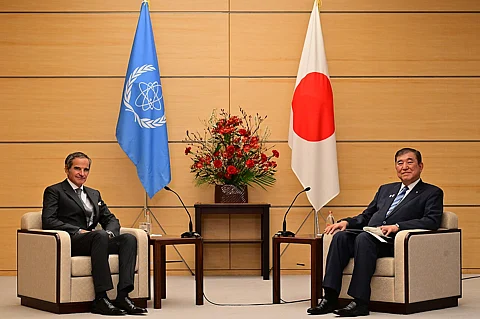

Japanese Prime Minister Shigeru Ishiba will travel to Canada on Sunday for the Group of Seven (G7) summit, where he is expected to hold high-stakes trade discussions with U.S. President Donald Trump. The talks will focus on persuading the U.S. to lift punitive tariffs on Japanese automobiles, a policy that has strained Japan’s auto industry and risks further destabilizing Ishiba’s politically vulnerable government.
The two leaders are scheduled to meet on the sidelines of the summit in Kananaskis, Alberta, marking their second face-to-face encounter since Trump’s return to office. The meeting follows a sixth round of high-level negotiations in Washington on Friday, where Japanese officials sought to lay the groundwork for a potential agreement.
Japan’s chief tariff negotiator, Ryosei Akazawa, held detailed discussions with U.S. Treasury Secretary Scott Bessent and Commerce Secretary Howard Lutnick, exploring avenues for a deal. However, analysts caution that Ishiba faces a delicate balancing act: securing relief from the 25% auto tariff and a separate, paused 24% across-the-board levy—which Trump frames as a "reciprocal" measure—without making concessions that could erode his domestic support.
For Ishiba, returning empty-handed may be politically safer than conceding too much. "If talks collapse, it could actually bolster Ishiba’s image as standing firm against U.S. pressure," said Michael Cucek, a political science professor at Temple University in Tokyo.
The prime minister’s ruling Liberal Democratic Party (LDP) faces an upper house election next month, following a bruising lower house defeat in November that left him reliant on coalition partners. Another poor showing could topple his government, forcing the U.S. to restart trade negotiations with a new administration.
"The worst outcome would be Ishiba caving for a bad auto deal," said Joseph Kraft, a financial political analyst at Rorschach Advisory in Tokyo. "I expect some kind of agreement, even if hastily arranged—Trump needs a win and isn’t deeply invested in G7 proceedings."
Failure to reach a deal may not immediately harm Japan’s economy, but prolonged tariffs could gradually stifle growth, warned Asuka Tatebayashi, a senior analyst at Mizuho Bank. April’s U.S. auto export data revealed a troubling trend: while shipment volumes rose sharply, their dollar value fell nearly 5%.
"This suggests manufacturers are absorbing costs, which isn’t sustainable," Tatebayashi said. Mizuho Research & Technologies estimates that current tariffs could trim 0.9% from Japan’s GDP.
Beyond bilateral talks, the G7 summit will address pressing global issues, including Middle East tensions following Israel’s strike on Iran, Russia’s war in Ukraine, and economic uncertainties fueled by trade disputes. As the sole Asian member, Japan is expected to emphasize Indo-Pacific security amid China’s growing assertiveness.
Ishiba also plans sideline meetings with non-G7 leaders, including South Korean President Lee Jae-myung and Ukrainian President Volodymyr Zelenskyy. Notably, the summit may conclude without a traditional joint declaration, instead releasing targeted statements on key issues—a rare departure for the consensus-driven bloc.
With Japan’s upper house election looming and Trump eager for a political victory, the Ishiba-Trump meeting could prove pivotal for both leaders. The prime minister has signaled he won’t rush a deal that undermines national interests, setting the stage for a tense diplomatic showdown.